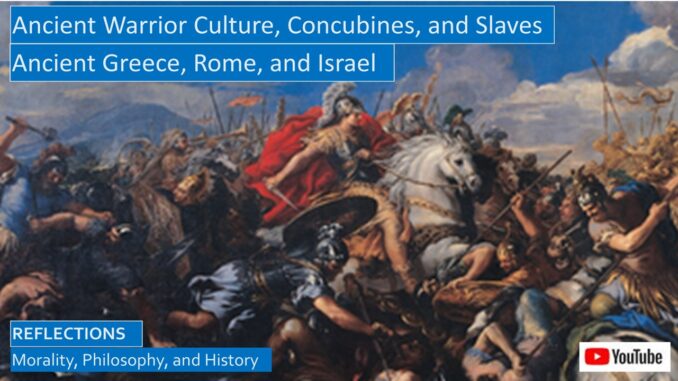
Ancient societies were warrior societies, they had no choice, all citizens had to fight for their city in time of war. There were no conscientious objectors in the ancient world, the ancients would have found the concept absurd. Battles between neighboring cities could be somewhat ritualized, with the winner negotiating terms with the losing side, but if the battle was more brutal all the men on the losing side could be slaughtered and all women and children could be enslaved, or sometimes they were also slaughtered.
You cannot understand the culture of ancient Greece and Rome, nor can you understand the culture of the Old Testament, until you realize that these were warrior cultures out of necessity. Most of the cruel stories and hard sayings of the Old Testament are easier to interpret if you understand the warrior culture of the ancient world, which was first expressed in Homer’s Iliad and Odyssey.
The Roman armies enslaved many from the cities and tribes they conquered, though maybe they could show leniency towards cities who opened their gates to their armies, or maybe not. Warfare accounted for most of the slaves in the ancient world, in Athens an estimated one in four people were slaves, in Rome the portion of slaves was much higher.
War was part of life, we read how King David was tempted by the sight of Bathsheba bathing on her roof when he let his general go to battle, for it was spring, after harvest, the time when all kings go to war. We read how Socrates served in the Athenian hoplite infantryman in the Peloponnesian War, all noblemen bought the weapons and armor and helmet and shield to serve as a hoplite, and most freeman without landed property served as rowers in the Athenian triple-decked fleet of trireme warships.
YouTube video for this blog: https://youtu.be/7QAZ_s6zw4E
YouTube script for more book links in downloaded PDF files:
https://www.slideshare.net/BruceStrom1/ancient-warrior-culture-concubines-and-slaves-ancient-greece-rome-and-israel
Ancient Warrior Societies, Blog 2, Greek and Roman Armies and Navies
https://seekingvirtueandwisdom.com/ancient-warrior-societies-blog-2-greek-and-roman-armies-and-navies/
Ancient Warrior Societies, Blog 3, World of the Old Testament
https://seekingvirtueandwisdom.com/ancient-warrior-societies-blog-3-world-of-the-old-testament/
Ancient Warfare in Ancient Greece, Rome, and Israel. Did Joshua Massacre Pagans in Promised Land?
https://youtu.be/9xKxqAbJ2qY
THE WARRIOR SOCIETY OF ANCIENT GREECE
The Greeks were the most formidable fighting force in the Near East. The mighty Persian empire loaded their army on ships to fight what they thought would be an easy victory but were decisively defeated by Athens and Sparta and their allies both on land and on sea in two separate wars. We include a discussion of both hoplite infantry combat as well as naval trireme combat.
Histories of Herodotus, The Greeks Defeat the Mighty Persians in the Greco-Persian Wars
http://www.seekingvirtueandwisdom.com/histories-of-herodotus-the-greco-persian-wars/
https://youtu.be/JjNcyLo54ko
The Greeks were the most formidable fighting force in the Near East. The mighty Persian empire loaded their army on ships to fight what they thought would be an easy victory but were decisively defeated by Athens and Sparta and their allies both on land and on sea in two separate wars. We include a discussion of both hoplite infantry combat as well as naval trireme combat.
The Greeks Triumph in the Battle of Salamis, Aeschylus and Herodotus: The Greco-Persian Wars
http://www.seekingvirtueandwisdom.com/aeschylus-and-herodotus-the-battle-of-salamis-greco-persian-wars/
https://youtu.be/cabAkQwHnlk
This established the reputation of the Greeks, later a Persian prince, Cyrus the Younger, hired a Greek hoplite infantry army to fight for the crown of Persia. The Greeks dominated the battle, but Cyrus was killed in the fighting. Losing their patron, the Greeks were forced to fight their way through the Persian Empire back to the Black Sea and then to Greece. This showed that the mighty Persians were vulnerable, later Alexander the Great of Macedon would conquer all of Persia and some of India also.
Xenophon’s Anabasis: The Persian Expedition, an Ancient Adventure Story
https://seekingvirtueandwisdom.com/xenophons-anabasis-the-persian-expedition-an-ancient-adventure-story/
https://youtu.be/DBG3JvyLP1E
When reflecting on the Iliad and the Odyssey, I was struck by the similarities between the stories of the Iliad and stories of Indian courage and stoic fortitude when facing life’s struggles, when facing your enemy, when risking all to argue for the life of your loved ones in the camp of the enemy. Another example of a successful camp meeting story was when later, after the fall of the Roman Empire, the courageous unarmed Pope Leo the Great met Attila the Hun in his camp, persuading him not to sack Rome.[1]
Iliad, Blog 3, Visiting the Enemy Camp, Greeks vs Indians
http://www.seekingvirtueandwisdom.com/iliad-blog-3-visiting-the-enemy-camp-greeks-vs-indians/
The Warrior Cultures of the Iliad and the American Indian, Bravely Visiting the Enemy Camp
https://youtu.be/ynIx-AVI2f8
The Greeks may have been the founders of Western Civilization, but they were first and foremost a warrior society. If the Greeks weren’t formidable warriors they would have been conquered by the mighty Persian Empire, which means that there would be no Socrates, no Plato, no Xenophon, the Greeks would not have been able to leave us a cultural legacy. Some of the Greek yearning for battle was satisfied by the ancient Olympic games open only to Greek cities, most of the Olympic competitions were competitions by warriors, it was not unusual for contestants to perish during the Olympic competitions.
Iliad, Blog 1, Why Should a Christian Read the Iliad?
http://www.seekingvirtueandwisdom.com/iliad_blog01/
The Iliad, the Basis of Greek Culture and the Western Philosophical Tradition
https://youtu.be/DpmuhZJUJn0
The Greek heroes chose to fight for ten long years for honor of King Menelaus, whose wife, Helen of Troy, was kidnapped by the Paris, Prince of Troy. The mighty men of Troy chose to fight to the end, though they knew their fight was futile, though they know that in the end Troy would be sacked and their women and children would be enslaved in distant Greece. The wife of Hector of Troy begs her husband Hector not to return to the battle, not to make her son an orphan, not to make her a widow.
Hector answers her in the Iliad:
“I would die of shame to face the men of Troy
and the Trojan women trailing their long robes
if I would shrink from battle now, a coward.
Nor does the spirit urge me on that way.
I’ve learned it all too well. To stand up bravely,
always to fight in the front ranks of Trojan soldiers,
winning my father great glory, glory for myself.
For in my heart and soul I also know this well:
the day will come when sacred Troy must die,
King Priam must die and all his people with him,
Priam who hurls the strong ash spear.”[2]
This section in the Iliad expounds the stoic fatalism of the Greeks:
“There are two great jars that stand on the floor of Zeus’s halls,
and hold his gifts, our miseries one, now good times in turn.
When Zeus who loves the lighting mixes gifts for a man,
now he meets with misfortune, now good times in turn.
When Zeus dispenses gifts from the jar of sorrow only,
he makes a man an outcast – brutal, ravenous hunger
drives him down the face of the shining earth,
stalking far and wide, cursed by gods and men.”[3]
The modern criticism that the ancient Greeks had an oppressive patriarchal society you fall far short of the mark, for the Greeks and indeed the Romans and all other long-lived ancient cultures were not merely patriarchal, they were instead downright brutal, true warrior societies.
If you have any doubts, consider the main theme of the Iliad, the very first word is the RAGE that is raging in the heart of Achilles, the rage Achilles feels towards King Agamemnon. During the years before the sack of Troy the Greeks had been marauding the towns surrounding Troy, capturing many of the local women to serve as concubines, Briseis belonged to Achilles, while Agamemnon had Chryseis, daughter of Chryses. Chryses was a priest of Apollo who brought a plague to the Greeks when they refused to release Chryseis. Angry that he was compelled to release his slave girl to halt the plague, Agamemnon seized Achille’s girl, Briseis, reasoning, Chryseis, Briseis, they both sound alike, what’s the difference?
Iliad Blog 2, Captured Concubines in the Iliad and the Torah
http://www.seekingvirtueandwisdom.com/iliad_blog02/
The Iliad, blog 4, Briseis, Chryseis, Aren’t all Concubines the Same?
http://www.seekingvirtueandwisdom.com/the-iliad-blog-4-briseis-chryseis-arent-all-concubines-the-same/
Concubines in the Iliad, Old Testament and Christian Tradition
https://youtu.be/bGHHD7XTvr0
Slaves and slavery, and women forced to be concubines, were part of the ancient warrior culture. The fear that one day your city-state would be defeated, and your women and children would be sold into slavery was a fear that all classes of society faced. In one painting, after the defeat of Troy we see the timid demeanor Trojan Queen Andromache at Greek slave auction.
Should we define slavery only as chattel slavery, where slaves are the personal property of another? Should medieval serfs, who are not chattel slaves and are permitted to marry and hold property, be considered slaves? Although chattel slavery was addressed in the Torah, or Old Testament, there were also many mentions of servants where it was unclear whether they were chattel slaves, or really serfs, or perhaps servants who had nowhere else to go, and were often part of the family. What we do know that although the systems of slavery varied by culture, there was always the problem that women slaves could be sexually abused, since the master could as he wished with his property.
Slaves in the Ancient World, Blog 1, Were Slaves the Employees of the Ancient World?
http://www.seekingvirtueandwisdom.com/slaves-in-the-ancient-world-blog-1-were-slaves-the-employees-of-the-ancient-world/
Slaves in Ancient Greece and Rome, Blog 2
http://www.seekingvirtueandwisdom.com/slaves-in-ancient-greece-and-rome-blog-2/
https://youtu.be/O67cmVRvBtA
Should black sharecroppers be considered serfs, or effectively slaves? Are minimum wages employees who do not earn a living wage really slaves?
The Bible doesn’t condemn this or that social system, because the real question is: Does our society treat laborers on the bottom rung of the social ladder fairly? Are all who work a forty-hour-week entitled to a living wage, where they can feed, clothe, and house their family with dignity? Should everyone live their life free from fear, and fear from want, as the Four Freedoms and the Atlantic Charter of FDR proclaim?
The fact is that the Old Testament prophets, the Jewish rabbis, the Stoic Philosophers, and the Christian Apostles and Church Fathers over the centuries do exhort us to treat the poor and immigrants with fairness, ensuring sure they can live with security and dignity.
Teachings about Slavery in the Bible and by the Early Church Fathers
http://www.seekingvirtueandwisdom.com/teachings-about-slavery-in-the-bible-and-by-the-early-church-fathers/
https://youtu.be/poyvJajCXnE
Why doesn’t the Bible Condemn Slavery? Why don’t we also ask: Why doesn’t the Bible condemn serfdom? Why doesn’t the Bible condemn a minimum wage too low feed your family with dignity?
Why Doesn’t the Bible Condemn Slavery? Perspectives from Jewish, Christian, and Stoic Traditions
https://seekingvirtueandwisdom.com/why-doesnt-the-bible-condemn-slavery/
https://youtu.be/Tz8EVYLuYoc
Modern scholars argue that the Iliad and Odyssey affected the Greek language and culture as profoundly as Shakespeare and the King James Bible affected the English language and culture. Some scholars even speculate that Greek literature and literacy was born when the Greeks sought to record these Homeric epics for posterity.
What distinguishes the Greek culture from other later warrior cultures like that of the American Indian several hundred years ago? Mainly literacy, and with literacy came the questioning of cultural values. While Homer celebrates the glory of war and the ancient Greek heroes, his hero Achilles also questions the futility of war, viewing Briseis not merely as a concubine, but as a sympathetic character who returns the affection of Achilles, who is willing to withdraw from combat, suffering possible humiliation, to force Agamemnon to return her to his arms.
The Iliad Blog 5, the Tide of Battle Turns Against the Greeks
http://www.seekingvirtueandwisdom.com/the-iliad-blog-5-the-tide-of-battle-turns-against-the-greeks/
The Iliad Blog 6, Embassy to Achilles, Oration, Failed Meeting
http://www.seekingvirtueandwisdom.com/the-iliad-blog-6-embassy-to-achilles-oration-failed-meeting/
The Iliad Blog 7, the deaths of Patroclus and Hector
http://www.seekingvirtueandwisdom.com/the-iliad-blog-7-the-deaths-of-patroclus-and-hector/
The Iliad of Homer: Glory, Honor, Madness and Futility of War
https://youtu.be/7lI2ZQ50wRc
Many of these same themes are echoed in the Odyssey. The misadventures of Odysseus in his decade long journey home from the Trojan War begin when his tribe raids a coastal town, seeking plunder and capturing women as slaves, but they linger too long and are attacked by the men of all the surrounding towns. Were the ancient Greeks the Vikings of the ancient world?
Odyssey, Blog 1, Waiting Those Very Long Years For Odysseus
http://www.seekingvirtueandwisdom.com/odyssey-blog-1-waiting-those-very-long-years-for-odysseus/
Odyssey, Blog 2, Odysseus Sings His Adventures
http://www.seekingvirtueandwisdom.com/odyssey-blog-2-odysseus-sings-his-adventures/
Odyssey, Blog 3, Odysseus Returns Home to Ithaca
http://www.seekingvirtueandwisdom.com/odyssey-blog-3-odysseus-returns-home-to-ithica/
Odyssey, Blog 4, The Slaughter of the Suitors
http://www.seekingvirtueandwisdom.com/odyssey-blog-4-the-slaughter-of-the-suitors/
Odyssey of Homer: Xenia, the Need for Hospitality
https://youtu.be/bUW4ZT9zpt8
Were the ancient Greeks also pirates? Famously, Julius Caesar was captured by pirates, who ransomed him rather so he would not be sold into slavery. The Cynic Philosopher Diogenes of Sinope, who famously lived in a pot in the marketplace of Athens, was captured and sold into slavery in Corinth. He refused to be ransomed and spent the rest of his life raising the sons of the Corinthian who purchased him.
Greek Cynic Philosophers
http://www.seekingvirtueandwisdom.com/diogenes-and-the-greek-cynic-philosophers/
https://youtu.be/zAAal5p8AX8
Likewise, the Odyssey begins with a romanticized account of Odysseus’ trustworthy slave Eumaeus, who was a prince captured by pirates and sold into slavery. The tables are turned on Odysseus when twice he is forced to be a sex slave both the witch Circe and the nymph Calypso, helpless to leave for his beloved Penelope, until the gods force Calypso to release him so he can continue his journey. Modern scholars wonder why he feels free to discuss these adventures with his wife Penelope after he arrives home, but this simply could indicate that those in the ancient world simply accepted that this is sometimes part of your fate.
Another later example of women being captured in war is in the later Roman conflicts between the Visigoth Alaric and the Roman Republic. First, Alaric’s wife and children were captured, then after he sacked Rome, he captured the Emperor’s sister, Galla Placidia. As Alaric was previously a Roman general, this conflict was more a civil war than a barbarian invasion. Shortly after her capture she is briefly married to the Visigoth ruler Ataulf until his premature death. Then she remarries back into the Roman and Byzantine ruling families.[4]
During the tales of the misadventures in the Odyssey the entire crew is lost due to their hubris, and only Odysseus is left on the shore of his native Ithaca. This tale resembles a Clint Eastwood western movie, Odysseus, his son Telemachus and some loyal slaves, armed with bows and arrows and some swords, face down and slaughter over a hundred suitors who seek to confiscate his home and estates.[5]
The Greeks did not look forward to a happy place when they crossed the River Styx. When the heroes of the Iliad descended into Hades, they were but mindless shades that flitted about forgetfully in the dark abyss below. When Odysseus descended into the underworld, he could only converse with the shades of the dead through an offering of blood to revive their memories. What survived the death of the heroes was their cleos, their honor, the memories of their valor displayed on the battlefield, their valiant deeds of war that would be sung by the bards to their children and grandchildren.
We reflect on other aspects of Ordinary Life and Justice in ancient Greece, Rome, and Israel. Ancient medicine, though surprisingly sophisticated, was nevertheless primitive compared to modern times, aspirin was unknown, many people died from fever, infant mortality was sky-high, and many women died in childbirth.
Ordinary Life and Justice in Ancient Athens, Rome, and Israel
http://www.seekingvirtueandwisdom.com/ordinary-life-and-justice-in-the-ancient-world/
https://youtu.be/vl8KGL5Yx2w
In our next blogs and video, we reflected on how the stresses of battles and wars affected the cultures of ancient Greece, Rome, and Israel, including its effect on how slaves and women were treated. Next, we will reflect on how warfare differed among these three cultures.
Ancient Warrior Societies, Blog 2, Greek and Roman Armies and Navies
https://seekingvirtueandwisdom.com/ancient-warrior-societies-blog-2-greek-and-roman-armies-and-navies/
Ancient Warrior Societies, Blog 3, World of the Old Testament
https://seekingvirtueandwisdom.com/ancient-warrior-societies-blog-3-world-of-the-old-testament/
DISCUSSING THE SOURCES
Reflecting on the Iliad and Odyssey is essential if you wish to understand Greek history and philosophy, and IMHO, the Old Testament as well.
Furthermore, since the Greco-Persian Wars and Peloponnesian Wars are also important in understanding Greek culture, we recommend reflecting on the histories by the Greek historians Herodotus, Thucydides, Xenophon, and the Roman historian Plutarch.
In particular, several of the main Platonic dialogues draw from the Thirty Tyrants installed in power and overthrown soon after the end of the Peloponnesian Wars.
Thirty Tyrants Ruling Athens After Spartan Victory in the Peloponnesian Wars
https://seekingvirtueandwisdom.com/thirty-tyrants-ruling-athens-after-spartan-victory-in-the-peloponnesian-wars/
https://youtu.be/rrcwdHyvIEg
Xenophon also wrote his adventures in the Anabasis, the Persian Expedition, and also the biography of Cyrus the Great, both of which inspired Alexander the Great to conquer Persia a generation later.
We discuss the Greek and Roman historians in depth in our Book Reviews on Greek History and Philosophy.
Book and Lecture Reviews of Ancient Greek History and Philosophy
http://www.seekingvirtueandwisdom.com/book-and-lecture-reviews-of-ancient-greek-history-and-philosophy/
https://youtu.be/472aVKkPsk8
[1] https://en.wikipedia.org/wiki/Pope_Leo_I
[2] Homer, “The Iliad,” translated by Robert Fagles (New York: Penguin Books, 1990), Book 6, p. 210.
[3] Homer, “The Iliad,” Book 24, p. 605.
[4] https://en.wikipedia.org/wiki/Alaric_I and https://en.wikipedia.org/wiki/Galla_Placidia

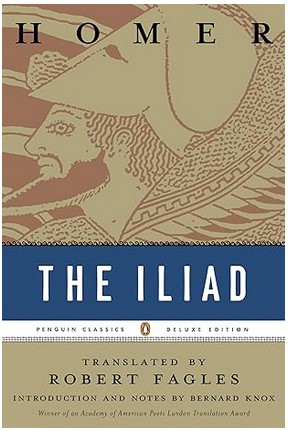
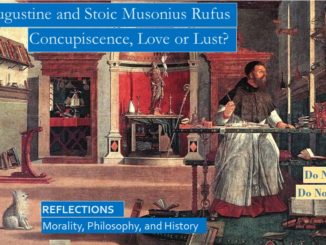
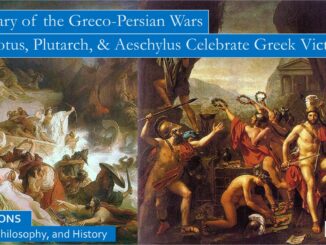
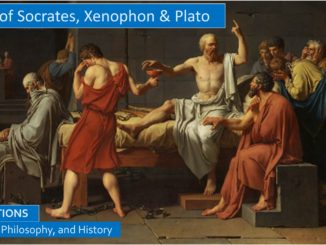
10 Trackbacks / Pingbacks